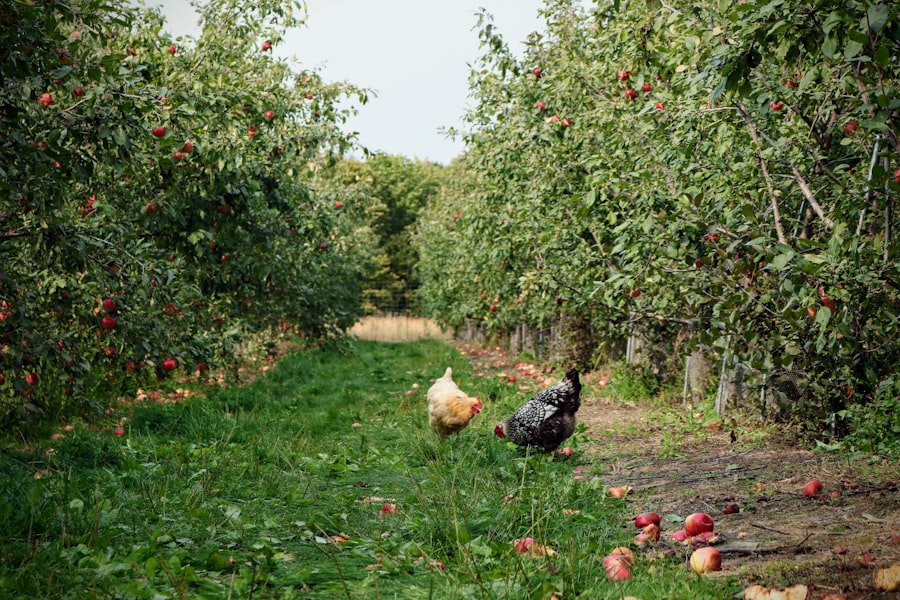Keeping chickens in Bay County has become increasingly popular in recent years. Many residents are discovering the benefits of raising their own chickens, from having a constant supply of fresh eggs to living a more sustainable lifestyle. In this article, we will explore the various benefits of keeping chickens in Bay County and provide tips on how to get started.
Key Takeaways
- Keeping chickens in Bay County has numerous benefits, including fresh eggs, natural pest control, and fertilizer for gardens.
- Local regulations on keeping chickens vary by city and township, so it’s important to research and follow the rules.
- When choosing a breed of chicken for Bay County, consider factors such as climate, egg production, and temperament.
- Building a chicken coop in Bay County requires careful planning and consideration of factors such as size, location, and materials.
- To maintain a healthy and happy flock, it’s important to provide proper feeding and watering, keep the coop clean, and protect chickens from predators.
Benefits of Keeping Chickens in Bay County
One of the main benefits of keeping chickens in Bay County is the ability to reduce food waste. Chickens are excellent at consuming kitchen scraps and leftovers that would otherwise end up in the landfill. By feeding your chickens these scraps, you not only reduce waste but also provide them with a nutritious and varied diet.
Another benefit of keeping chickens is the access to organic fertilizer. Chicken manure is rich in nutrients and can be used to fertilize your garden or plants. This eliminates the need for chemical fertilizers and promotes a more sustainable approach to gardening.
In addition to reducing waste and providing organic fertilizer, keeping chickens can also save you money. By having your own flock, you no longer need to purchase eggs from the store. This can add up to significant savings over time, especially if you consume a large number of eggs or use them frequently in cooking and baking. Furthermore, if you choose to raise meat birds, you can also save money on meat by processing your own chickens.
Understanding Local Regulations on Keeping Chickens
Before starting your own backyard flock, it is important to understand the local regulations on keeping chickens in Bay County. Each municipality may have its own set of rules and restrictions regarding the number of chickens allowed, coop requirements, and noise regulations.
To ensure compliance with local regulations, it is recommended to contact your local government or zoning department for specific information on keeping chickens in your area. They will be able to provide you with the necessary permits and guidelines to legally keep chickens on your property.
Choosing the Right Breed of Chicken for Bay County
When choosing the right breed of chicken for Bay County, it is important to consider the climate and environment. Bay County experiences a humid subtropical climate, with hot summers and mild winters. Therefore, it is important to choose breeds that are well-suited to these conditions.
Some popular breeds that thrive in Bay County include the Rhode Island Red, Plymouth Rock, and Sussex. These breeds are known for their hardiness, adaptability, and ability to tolerate heat. They also tend to be good layers, producing a consistent supply of eggs throughout the year.
When selecting a breed, it is also important to consider factors such as egg production, temperament, and size. If you are primarily interested in egg production, breeds such as the Leghorn or Australorp may be a good choice. If you have children or want chickens that are friendly and docile, breeds like the Orpington or Silkie may be more suitable.
Building a Chicken Coop in Bay County
A chicken coop is an essential component of keeping chickens in Bay County. It provides shelter, protection from predators, and a comfortable environment for your flock. When building a chicken coop, there are several factors to consider to ensure the safety and well-being of your chickens.
Firstly, it is important to provide adequate space for your chickens. The general rule of thumb is to allow at least 4 square feet of coop space per chicken. This ensures that they have enough room to move around comfortably and prevents overcrowding.
Secondly, the coop should be secure and predator-proof. This means using sturdy materials such as hardware cloth or welded wire mesh for the walls and windows. The coop should also have a solid roof to protect against rain and other elements.
Additionally, it is important to provide proper ventilation in the coop. Good airflow helps prevent moisture buildup and reduces the risk of respiratory issues in your chickens. This can be achieved by installing windows or vents that can be opened and closed as needed.
Chicken Coop Design and Construction Tips

When designing and constructing a chicken coop in Bay County, there are several tips to keep in mind. Firstly, choose durable materials that can withstand the local climate and weather conditions. This includes using pressure-treated lumber for the frame, as well as weather-resistant siding and roofing materials.
It is also important to provide adequate insulation in the coop. This helps regulate the temperature inside and keeps your chickens comfortable throughout the year. Insulation can be added to the walls, roof, and floor of the coop using materials such as foam board or fiberglass insulation.
Furthermore, a clean and well-maintained coop is essential for the health and well-being of your chickens. Regularly clean out the coop to remove droppings and bedding material, and disinfect it to prevent the spread of diseases. Provide fresh bedding material such as straw or wood shavings to keep the coop clean and dry.
Feeding and Watering Your Chickens in Bay County
Proper nutrition is crucial for the health and productivity of your chickens. In Bay County, it is important to provide a balanced diet that meets their nutritional needs. This can be achieved by feeding them a combination of commercial chicken feed, kitchen scraps, and forage.
Commercial chicken feed should make up the majority of their diet, as it is specially formulated to provide all the necessary nutrients. Choose a feed that is appropriate for their age and purpose (layers, meat birds, etc.). Supplement their diet with kitchen scraps such as vegetable peels, fruit scraps, and bread. However, avoid feeding them anything toxic or harmful, such as chocolate or onions.
In addition to food, clean water is essential for your chickens’ health. Provide fresh water daily in clean containers that are large enough for all your chickens to drink from. It is important to regularly clean and refill the water containers to prevent the growth of bacteria and algae.
Maintaining a Clean and Healthy Chicken Coop
Maintaining a clean and healthy chicken coop is crucial for the well-being of your flock. A dirty coop can lead to the spread of diseases and parasites, as well as unpleasant odors. Therefore, it is important to establish a regular cleaning routine.
Start by removing any droppings and soiled bedding material from the coop on a daily basis. This helps prevent the buildup of ammonia and keeps the coop smelling fresh. Once a week, thoroughly clean the coop by removing all bedding material, disinfecting surfaces, and replacing with fresh bedding.
It is also important to regularly inspect your chickens for signs of illness or parasites. Look for any changes in behavior, appetite, or appearance. If you notice anything unusual, consult a veterinarian who specializes in poultry health.
Protecting Your Chickens from Predators in Bay County
Bay County is home to a variety of predators that pose a threat to chickens, including raccoons, foxes, and hawks. To protect your flock from these predators, it is important to take certain precautions.
Firstly, ensure that your chicken coop and run are securely fenced. Use hardware cloth or welded wire mesh with small openings to prevent predators from gaining access. Bury the fencing at least 12 inches deep to deter digging animals.
Additionally, provide secure locks on all doors and windows of the coop. This prevents predators from forcing their way in and keeps your chickens safe at night when they are most vulnerable.
Consider installing motion-activated lights or alarms around the coop to deter nocturnal predators. These can startle predators and discourage them from approaching the coop.
Enjoying Fresh Eggs and a Sustainable Lifestyle in Bay County
Keeping chickens in Bay County offers numerous benefits, from having a constant supply of fresh eggs to living a more sustainable lifestyle. By reducing food waste, providing organic fertilizer, and saving money on eggs and meat, raising chickens can be a rewarding and fulfilling experience.
Before starting your own backyard flock, it is important to understand the local regulations on keeping chickens and obtain the necessary permits. Choose the right breed of chicken for Bay County’s climate and environment, and build a secure and comfortable coop for your flock. Provide a balanced diet and clean water for your chickens, and maintain a clean and healthy coop to prevent the spread of diseases.
By taking the necessary precautions to protect your chickens from predators, you can enjoy the benefits of keeping chickens in Bay County for years to come. So why not start your own backyard flock today and enjoy the fresh eggs and sustainable lifestyle that comes with it?
If you’re interested in Bay County’s decision to allow residents to keep chickens, you might also want to check out this informative article on how to care for goslings. Poultry Wizard provides valuable insights on breeding geese and offers practical tips on ensuring the well-being of these adorable creatures. Whether you’re a beginner or an experienced poultry enthusiast, this article will guide you through the process of raising goslings with care and expertise. To learn more, click here: https://poultrywizard.com/breeding-geese/how-to-care-for-goslings/.
FAQs
What is Bay County’s policy on keeping chickens?
Bay County allows residents to keep chickens on their property, as long as they follow certain guidelines and obtain a permit.
How many chickens can a resident keep?
Residents are allowed to keep up to six chickens on their property.
What are the guidelines for keeping chickens in Bay County?
Residents must obtain a permit from the county, keep their chickens in a secure coop or enclosure, and ensure that the chickens do not create a nuisance for neighbors.
Are roosters allowed?
No, roosters are not allowed in Bay County due to their loud crowing and potential for aggression.
What are the benefits of keeping chickens?
Keeping chickens can provide a source of fresh eggs, natural pest control, and fertilizer for gardens.
What are the potential drawbacks of keeping chickens?
Chickens can create noise and odor, and may attract predators such as raccoons or coyotes. Proper care and maintenance of the coop and enclosure can help mitigate these issues.
What should I do if my neighbor is keeping chickens in violation of county guidelines?
Residents can report violations to the Bay County Animal Control department.
Meet Walter, the feathered-friend fanatic of Florida! Nestled in the sunshine state, Walter struts through life with his feathered companions, clucking his way to happiness. With a coop that’s fancier than a five-star hotel, he’s the Don Juan of the chicken world. When he’s not teaching his hens to do the cha-cha, you’ll find him in a heated debate with his prized rooster, Sir Clucks-a-Lot. Walter’s poultry passion is no yolk; he’s the sunny-side-up guy you never knew you needed in your flock of friends!







